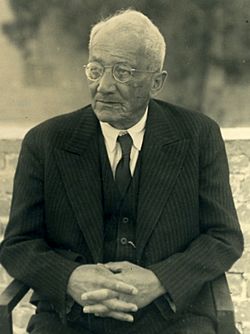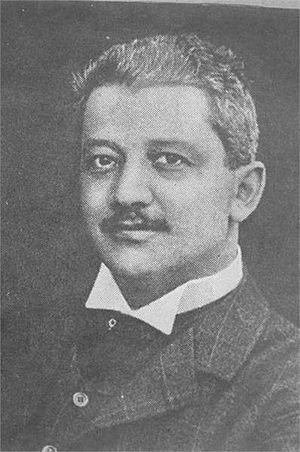Franz Oppenheimer facts for kids
Quick facts for kids
Franz Oppenheimer
|
|
|---|---|

Franz Oppenheimer in 1936.
|
|
| Born | March 30, 1864 |
| Died | September 30, 1943 (aged 79) |
| Nationality | German |
| Field | Social economy, sociology |
| School or tradition |
Liberal socialism |
| Alma mater | University of Kiel |
| Influences | David Ricardo, Henry George, Ludwig Gumplowicz |
| Contributions | Conquest theory of state formation |
Franz Oppenheimer (born March 30, 1864 – died September 30, 1943) was an important German thinker. He was a sociologist, which means he studied how societies work. He was also a political economist, someone who studies how governments and money systems are connected. Oppenheimer wrote a lot about the state and how it came to be.
Contents
A Life of Learning and Change
Franz Oppenheimer first studied medicine. He worked as a doctor in Berlin from 1886 to 1895. After some years, he became very interested in how society and money systems work.
He stopped being a doctor and became the editor-in-chief of a magazine called Welt am Morgen. In 1909, he earned his PhD in Kiel. He then taught in Berlin for several years. In 1919, he became the first professor of Sociology in Germany at Johann Wolfgang Goethe University in Frankfurt.
Helping Farmers in Palestine
In 1911, Jewish immigrants in Ottoman Palestine started a special farm. It was called the "Co-operative in Merhavia." This farm used Oppenheimer's ideas for how farmers could work together. The project changed later, but his ideas helped create a new type of community farm called a moshav.
Moving to America
Oppenheimer taught in Palestine from 1934 to 1935. In 1936, he became an honorary member of the American Sociological Association. When the Nazis came to power in Germany, he had to leave. He moved to Los Angeles in 1938, traveling through Tokyo and Shanghai. In 1941, he helped start The American Journal of Economics and Sociology.
Franz Oppenheimer's son, Hillel Oppenheimer, became a famous professor of botany.
Oppenheimer's Big Ideas
Franz Oppenheimer had many important ideas about how societies and governments work.
The State
In 1908, Oppenheimer published his most famous book, Der Staat (which means The State in English). In this book, he explained his ideas about how states (countries or governments) began.
He believed that states did not start because people agreed to a "social contract" (like some other thinkers believed). Instead, he thought states began when strong groups, like conquering warlords, took control over weaker communities. These powerful groups then created rules to keep control and benefit themselves. This idea is called the "conquest theory of the state."
Oppenheimer wrote that the state was created by a winning group to rule over a defeated group. The main goal was for the winners to gain wealth from the losers. He said that no early state in history started in any other way.
Economic vs. Political Means
Oppenheimer also talked about two main ways people get what they need:
- Economic means: This is when people work for what they get, or trade their own work for someone else's work. It's about fair exchange.
- Political means: This is when people take what they need from others by force, without giving anything back. Oppenheimer saw this as a form of "robbery" by powerful groups.
He believed that the state, in its early forms, often used "political means" to create inequality.
A Vision for Society
Oppenheimer called himself a liberal socialist. This means he believed in both freedom and fairness for everyone. He thought that economic systems would work best if people cooperated. He spent much of his life helping people set up voluntary, cooperative communities, like the kibbutzim in Israel.
He believed that society could change for the better through evolution, not violence. His dream was a state where there were no classes or special interests. In this ideal state, the government would protect everyone's common interests fairly.
Oppenheimer was a big fan of Henry George, an American social reformer. Both Oppenheimer and George believed that while the state had often protected special privileges, democracy could change it. They hoped that governments would become more caring and fair. Oppenheimer saw Nazism and Bolshevism as old forms of unfair rule trying to come back. He hoped their downfall would lead to a truly free and fair time.
Influence on Ludwig Erhard
Oppenheimer taught Ludwig Erhard, who later became a German chancellor. Erhard didn't agree with all of Oppenheimer's ideas, but he learned a lot from him. Erhard said that Oppenheimer's ideas about society deeply influenced him. He learned that "capitalism" could lead to inequality, but that communism led to a lack of freedom. Erhard believed there had to be a "third way." He tried to create this "third way" with the idea of a social market economy in Germany.
Impact of The State
In the 1920s, Der Staat was a very popular book. It was translated into many languages, including English, French, and Japanese. It influenced many people who believed in libertarianism, communitarianism, and anarchism.
Writings
Oppenheimer wrote many books and essays, about 40 books and 400 essays in total. They covered topics like sociology, economics, and political issues of his time. His most famous work was Der Staat.
- Freiland in Deutschland. Berlin, W.F. Fontane & Co., 1895.
- Der Staat. 1929.
- Gesammelte Schriften. Berlin
- Theoretische Grundlegung. 1995 ISBN: 3-05-002673-1
- Politische Schriften. 1996 ISBN: 3-05-002876-9
- Schriften zur Marktwirtschaft. 1998 ISBN: 3-05-003156-5
See also
 In Spanish: Franz Oppenheimer para niños
In Spanish: Franz Oppenheimer para niños
- Classical liberalism
- Economic sociology
- Georgism
- Left-libertarianism
- Mutualism
- Our Enemy, the State
- Political sociology
- Ricardian socialism


